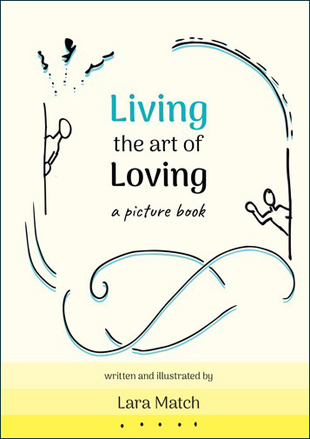This unique book combines few words together with simple drawings, pointing people toward what we all desire: unity.
After a two-page explanation of her method, author and illustrator Lara Match begins simply with, “We all have thoughts. It takes a moment to even notice that another person is there.” Drawings on facing pages show one person caught up in themselves and their thoughts and processes, while another person stands before them with emotions contained and ideas to share, hoping to be let into the other’s presence.
The wisdom then continues, with care and deliberation (three things we all need in our distracted times): “To make room for them [meaning, the other person], we let go of our thoughts.” Then, “That is not easy to do. It takes time and focus.”
Indeed — most of the time, we don’t do this well, or at all; but Lara Match teaches with clarity and patience.
A few pages later, the lesson expands, revealing itself as both psychologically astute and encompassing of every great religious and meditative tradition: “We become an empty container for them [the other person]. So empty that we almost don’t exist.” The evolving drawing of human figures shows the person who had been caught up in themselves alone, now fading from view, so that the other person may be seen and heard.
“Our emptiness draws them out, like a vacuum. There is a momentum to their sharing, as the stumbling blocks have been removed.”
Connectedness, harmony, unity, mutual respect, and mutual care are all presented here, in this first episode of a beautiful and necessary book. There are four more episodes (“How do we build unity in a new place?”; “How do we invite others into our unity?”; “What do we do with conflict?”; “What do we do with suffering?”).
They are followed at the back of the book by a short explanation of where inspiration for these teachings comes from: a charismatic Italian Catholic woman, Chiara Lubich, who “while taking cover in bomb shelters [during World War II], asked what was worth living for that wouldn’t crumble.” She founded the Focolare movement. Focolare means “hearth” in Italian. Today, it is much wider than Lubich’s Catholicism. It comprises people of many religious traditions as well as people who subscribe to no religion who all emphasize, in Lara Match’s words, “unity between people in concrete and practical ways, with love as a radical force for good.”
